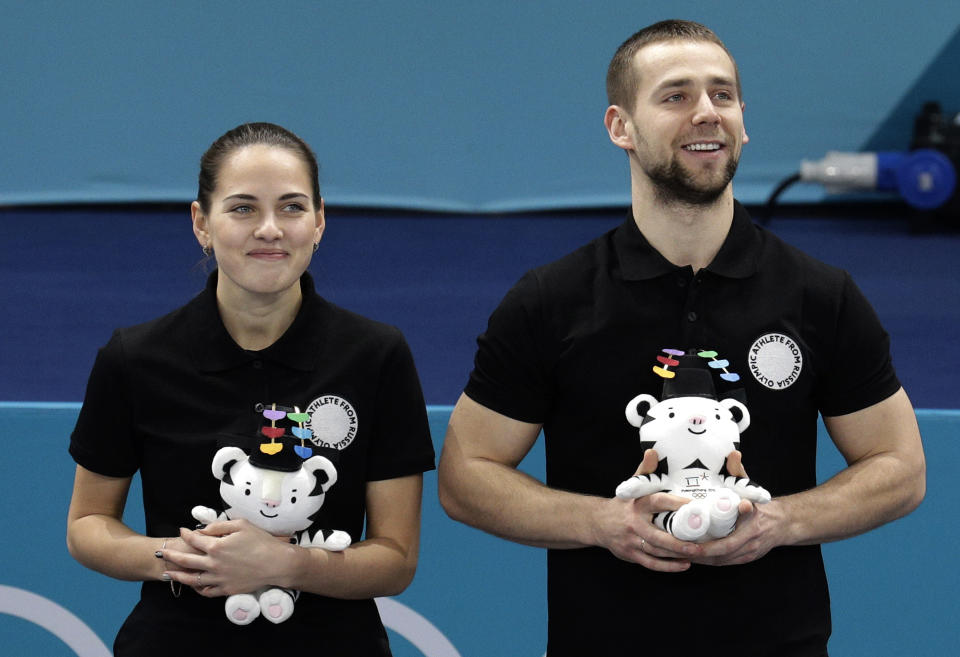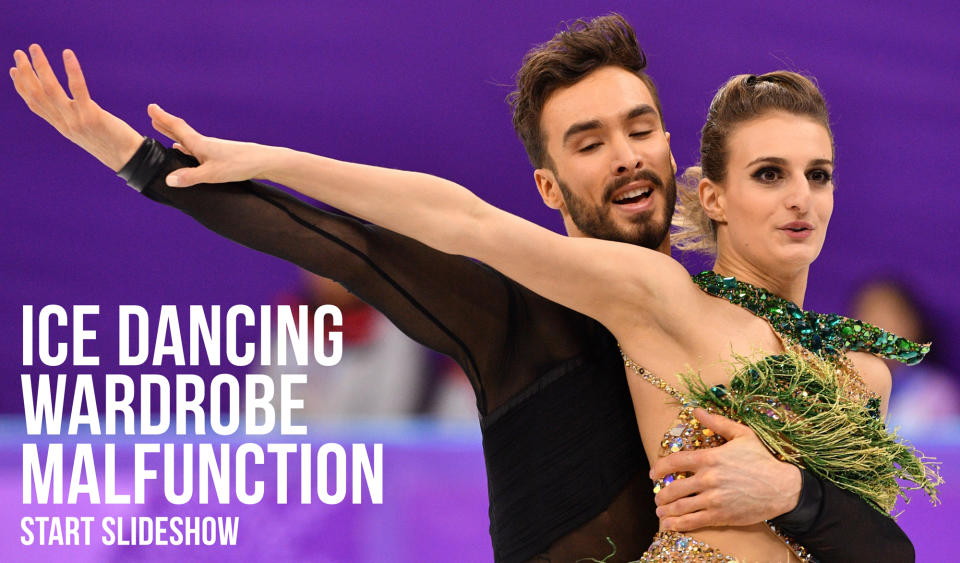A Russian curler charged with doping could end Putin's Olympic pep rally. He could also make it even sweeter
GANGNEUNG, South Korea – Done in, by of all people, a curler.
Russia is officially banned from these Winter Olympics and hasn’t managed to snag a gold medal. It has pretty much won everything else about the PyeongChang Games.
They still sent 168 athletes under the “Olympic Athletes from Russia” banner. The competitors still wear the nation’s famed red and white colors. Fans came in droves to offer support, shout Russian chants and wave Russian flags. At one hockey game, a banner was even unfurled featuring the likeness of Russian President Vladimir Putin. The Russians have reveled in showing up the International Olympic Committee.
Putin had worked to turn Russia getting busted red-handed for the biggest state-run doping and sample-tampering rings ever uncovered by the World Anti-Doping Agency into a positive. He and his state-run media rejected the story as fake news from jealous outside forces.
“State-sponsored system?” said Russia fan Roman Bykovm of Moscow. “We don’t believe.”
The Russians were victims. Their athletes were heroes.

The IOC, which caved and let the Olympic Athletes from Russia compete in PyeongChang in the first place, was hinting it would lift the ban on the final day here and let the Russian flag fly at Closing Ceremonies. That would likely occur hours after the heavily favored Russian men’s hockey team should win gold for the first time since 1992 (a “Unified Team” then).
That would leave Putin cackling his way out the door.
It still may happen. There is no reason to expect the IOC to take a hardline against Russia and all its money. It may not, though, not now, and that’s because of the curler.
Alexander Krushelnitsky, who competed with his wife here in mixed-doubles curling, tested positive for meldonium late Sunday. On Monday, he was charged with doping.
He’s out. And the IOC, which foolishly went along with the ban/non-ban of the Russians, looks even more pathetic than normal now that it has been burned.
“There was a sense from the IOC that we wanted individual athletes, if they could prove they were clean, to have the chance to participate in the Olympic games,” IOC spokesperson Mark Adams said Monday at a news conference. “I think we would very much stick by that process, stick by that decision that athletes should not be judged as a group.”
They trusted the Russians. That rarely ends well.
One cheating athlete does not mean that all Russian athletes are cheating. Nor does it suggest the Russians are, again, running an elaborate campaign to take performance-enhancing drugs. It’s one guy (so far). The lack of golds, after winning 11 in Sochi, suggests nothing untoward is happening.
Besides, nearly every nation here has had individual athletes cheat on their own. The United States perhaps more than any other.
There are no glass houses here. There is no moral high ground.
Still, for a Russian to do it after the country was banned takes particular gall. And a curler? Maybe it’s no surprise when it comes to Russia, which was also caught doping in the Sochi Paralympics, that even curlers are on something. But the jokes do write themselves.
Meldonium can increase stamina. Just how tired was this guy sliding stones down the ice in a sport most often played while slugging a couple beers? The 15km cross-country ski race it is not.
For the Russians and the IOC and the skeptical athletes here from all the other nations, though, this isn’t a laughing matter.
They got into the Games via often ridiculous rulings from Court of Arbitration for Sport. There, individual athletes cited a lack of direct evidence they had failed a drug test as reason they should still compete. However, the reason there was no direct evidence often was because Russia constructed a building next to the testing lab in Sochi, drilled a small hole in the wall and had dirty samples slipped out and clean ones slipped in overnight.
Essentially, Russia was banned for cheating so thoroughly only to be reinstated because it cheated so thoroughly. The lab in PyeongChang had to be fitted with 24-hour security and an elaborate closed-circuit camera system.
“It is no surprise you don’t have all the evidence you want,” WADA director general Olivier Niggli said.
The Russians were already spinning all of this as untrue and unfair and a conspiracy theory against them perpetuated by the liberal Western media. They theorized to reporters that Krushelnitsky’s food or drink might have been spiked by the country’s political enemies. Sure. They went after the curler. It’s from the Despot 101 playbook. They’ll hold themselves up as the aggrieved; the poor, poor victims.
“I don’t believe that a young man, a clever man, will use the same doping which was so big the last two years,” curling coach Sergei Belanov told reporters of Krushelnitsky taking meldonium, the substance that Russian tennis player Maria Sharapova was busted taking. “It’s stupid. But Alexander is not stupid. So, sorry, I don’t believe it.”
Does the IOC? It better. Even if the IOC does, however, will it have the courage to maintain the ban, or even increase it? Will it risk Russia’s wrath?
Or, will the Closing Ceremonies, with that men’s hockey team likely triumphantly marching into Olympic Stadium waving long-lost hockey gold and the Russian flag, serve as a pep rally out of Vlad Putin’s dreams?
The doping curler be damned.
More from Yahoo Sports:
• Russian curler formally charged with doping in PyeongChang
• Ice dancer on wardrobe malfunction: “It was my worst nightmare.”
• Adam Rippon won’t actually be an NBC Olympic correspondent
• Vonn playing “mind games” after third-place training run
• Gold medalist comforts silver medalist in true Olympic comfort


